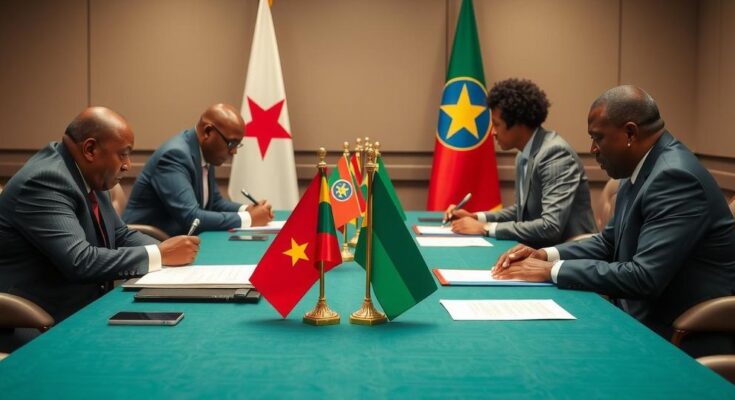The African Union has called for prompt implementation of an agreement between Ethiopia and Somalia to alleviate maritime access tensions. Following a contentious deal between Ethiopia and Somaliland, both nations are urged to cooperate for regional stability. Technical discussions are planned, but the future of the agreement with Somaliland remains unclear, amidst heightened diplomatic tensions.
On February 17, 2024, the African Union (AU) urged Ethiopia and Somalia to promptly implement a critical agreement designed to ease tensions over Ethiopia’s access to maritime routes. This call follows Ethiopia’s controversial deal with Somalia’s self-declared independent region, Somaliland, to lease coastline for a port and military base. The agreement is seen as pivotal amidst concerns that Somalia views it as a breach of its sovereignty, raising fears of potential conflict in the region.
The AU’s statement referenced hours of Turkish-mediated discussions, resulting in what was termed an “historic” agreement between Somalia and Ethiopia. Turkish President Recep Tayyip Erdogan expressed optimism that the accord would facilitate Ethiopia’s long-standing desire for maritime access. Technical dialogues are anticipated to commence early next year following this agreement.
Somali President Hassan Sheikh Mohamud emphasized the necessity of mutual cooperation for regional stability. Moreover, Moussa Faki Mahamat, the Chairperson of the AU Commission, highlighted the urgency of implementing the agreed measures, although specifics were not disclosed. The Intergovernmental Authority on Development (IGAD) also acknowledged the agreement as a significant step towards resolving bilateral disputes amicably.
According to the accord’s provisions, both nations committed to setting aside contentious issues to ensure “reliable, safe and sustainable access” to the sea for Ethiopia, with respect to Somalia’s sovereign rights. The agreement also mentions plans for technical discussions to commence by the end of February and concludes within four months, addressing any differences through dialogue and potential Turkish support. However, the future of the agreement between Ethiopia and Somaliland remains uncertain as Ethiopian officials refrained from commenting on this aspect.
Amidst the evolving dynamics, Somalia has fortified relations with Egypt, Ethiopia’s historical rival, and expelled the Ethiopian ambassador earlier this year. These tensions underscore the complexities surrounding Ethiopia’s loss of sea access following Eritrea’s independence in 1993, compelling the nation to seek new pathways to maritime trade.
The African Union’s appeal for Ethiopia and Somalia to expedite the implementation of their recent agreement stems from a turbulent history of territorial disputes and geopolitical tensions in the region. Following Ethiopia’s deal with the semi-autonomous region of Somaliland, Somalia has expressed concerns regarding the implications for its sovereignty. This situation comes on the heels of both nations experiencing tensions heightened by regional rivalries, necessitating urgent diplomatic engagement to avert potential conflict.
The African Union’s urging for the swift implementation of the Ethiopia-Somalia agreement reflects significant geopolitical maneuvers aimed at regional stability. As both nations move forward into technical discussions, the implications of their accord carry the potential to reshape diplomatic relations and maritime access. Nonetheless, the uncertain status of Ethiopia’s agreement with Somaliland poses a continued challenge. The overall trajectory will depend on effective dialogue and adherence to commitments made during negotiations.
Original Source: www.seychellesnewsagency.com




